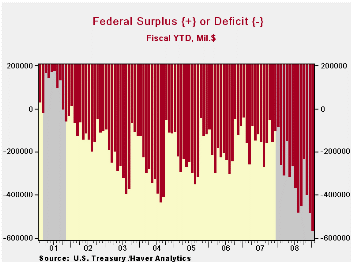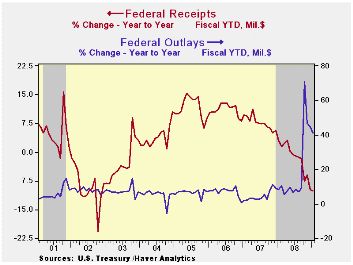 Global| Feb 11 2009
Global| Feb 11 2009U.S. Budget Deficit Surges As Revenues Collapse & Spending Jumps
by:Tom Moeller
|in:Economy in Brief
Summary
The U.S. government's January budget deficit continued to reflect the combined effects of a U.S. recession and two wars.The monthly deficit rose to $83.8 billion. Like December's figure, however, the relatively moderate deficit [...]

The U.S. government's January budget deficit continued to reflect the combined effects of a U.S. recession and two wars.The monthly deficit rose to $83.8 billion. Like December's figure, however, the relatively moderate deficit compares to a usual budget surplus for the month. For the first four months of this fiscal year the government's budget deficit totaled $569.0 billion. That compares to a deficit of $89.0 billion during last fiscal year's first four months. Consensus projections were for a January deficit of $79.0B.
Many forecasts for the budget deficit during all of this fiscal year are near $700B. If realized, that would swell the deficit to about 5% of GDP following last year's roughly 3.2% and FY07's marginal 1.2%. The Congressional Budget Office's recent deficit estimate of $1.2 trillion amounts to 8.3% of GDP. It assumes that revenues will fall 6.6% year-to-year and that outlays will increase 19.0%.
Adjusted for cyclicality, the CBO's latest "standardized" budget deficit estimate totaled 0.9% of GDP for 2009. The estimate was made in December.
Net revenues during January fell 11.4% from last year and for the first four months of FY09 they were down 10.2%. Individual income tax receipts reflected lower employment levels and fell 7.7% year-to-year. Corporate tax receipts were hit even harder and they fell by more than one-third. Growth in unemployment and social insurance taxes grew just 1.0%, the least since late 2003.
U.S. government outlays surged by forty-one percent from last fiscal year's first four months. Defense spending (19% of total outlays) rose 8.9%. The gain does not reflect the full cost of the resources devoted to Iraq & Afghanistan since much of the spending would have occurred anyway. Medicare expenditures (12% of outlays) jumped by 22.4% and "income security" spending (11% of outlays) jumped 25.7% after 7.5% growth last year. Social security payments rose 6.4% but net interest payments fell by more than one-quarter with lower interest rates.
The Government's financial data are available in Haver's USECON database, with extensive detail available in the specialized GOVFIN.
The Congressional Budget Office's Summary of Estimated Cost of H.R. 1, The American Recovery and Reinvestment Act of 2009 as Passed by the Senate on February 10, 2009 can be found here.
| US Government Finance | January | December | Y/Y | FY 2008 | FY 2007 | FY 2006 |
|---|---|---|---|---|---|---|
| Budget Balance | -$83.8B | $-83.6B | $17.8B (1/08) |
-$454.8B | -$161.5B | -$248.2B |
| Net Revenues | $226.1B | $237.8B | -11.4% | -1.7% | 6.7% | 11.8% |
| Net Outlays | $309.9B | $321.4B | 30.6% | 9.1% | 2.8% | 7.4% |
Tom Moeller
AuthorMore in Author Profile »Prior to joining Haver Analytics in 2000, Mr. Moeller worked as the Economist at Chancellor Capital Management from 1985 to 1999. There, he developed comprehensive economic forecasts and interpreted economic data for equity and fixed income portfolio managers. Also at Chancellor, Mr. Moeller worked as an equity analyst and was responsible for researching and rating companies in the economically sensitive automobile and housing industries for investment in Chancellor’s equity portfolio. Prior to joining Chancellor, Mr. Moeller was an Economist at Citibank from 1979 to 1984. He also analyzed pricing behavior in the metals industry for the Council on Wage and Price Stability in Washington, D.C. In 1999, Mr. Moeller received the award for most accurate forecast from the Forecasters' Club of New York. From 1990 to 1992 he was President of the New York Association for Business Economists. Mr. Moeller earned an M.B.A. in Finance from Fordham University, where he graduated in 1987. He holds a Bachelor of Arts in Economics from George Washington University.
More Economy in Brief
 Global| Feb 05 2026
Global| Feb 05 2026Charts of the Week: Balanced Policy, Resilient Data and AI Narratives
by:Andrew Cates






